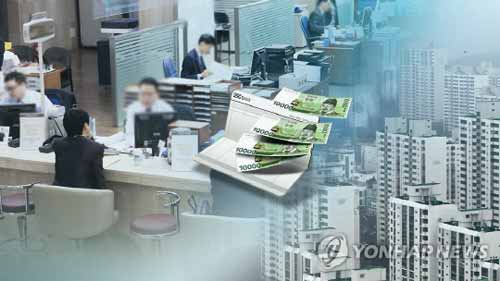Review on ‘6% exceeding’ mortgage loan… ‘Household debt interest’ may blow up
Cho Eun Guk | ceg4204@ | 2018-03-23 11:17:24

By Yonhab News
According to a financial report on March 22, the interest rate on domestic mortgage loans and so on has risen sharply due to the Fed`s rate hike.
`Coppice`, which is the benchmark interest rate, has risen since September last year, reaching 1.75% (based on balance) as of February. The interest rate on five-year AAA-rated financial bonds, which are the benchmark for bank bond yields, also rose to 2.720% on May 21 from 2.0% at the beginning of last year.
As interest rates, which can be used to determine the trend of lending rates, have risen, the interest rate on loans has continued to rise. The central bank`s interest rate on partial repayment method, which is 10 years or more maturity, is up 0.12 % points in three months. The highest interest rate in the provincial bank, Jeju Bank, reaches 5.42%.
Meanwhile, the Federal Reserve is expected to raise interest rates by 0.25 percentage points this time, and it is expected to raise the interest rate two or three more times this year, so that the market interest rate will rise more steeply. If the interest rate reversal prolongs, concerns over capital outflow increase, so the Bank of Korea, which is cautious about raising interest rates, seems inevitable to adjust interest rates soon.
Since the market interest rate is reflected in advance reflecting the base rate hike signal, the interest rate will continue to rise even if the Fed and the Bank of Korea do not raise the policy rate.
Major banks` interest rates in the second half of the year are in the low 4% range as of March, and some local banks such as Gwangju Bank and Jeju Bank have exceeded 5% annually. However, if the current rate hike continues, the central bank`s maximum interest rate will likely exceed 6% by the end of this year.
When interest rates reach 6% per annum, the delinquency risk of marginal households also rises. If borrowers with a KRW 400 million apartment use a KRW 200 million main bourse, the annual interest rate will increase from KRW 800 million to KRW 10 million to KRW 2 million even if the interest rate on the loan increases by only 1% from 4% to 5%. If the household debt has already exceeded KRW 1,450 trillion and the limit borrower is expected to be over 1 million households, if the interest rate continues to rise, it is highly likely that the overdue bomb will be realized.
An specialist from the financial sector said, "The BOK will also adjust the benchmark interest rate because the US Federal Reserve raised the interest rate, and the BOK signaled that it would raise market interest rates, It will continue this year."
By Cho Eun Guk ceg4204@
